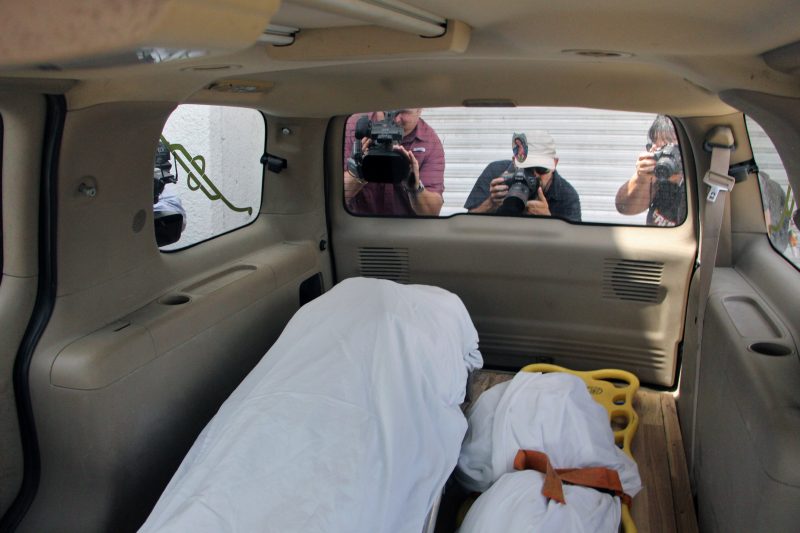Salvadoran family’s dangerous trek ended just shy of their dream
Oscar Martinez and his daughter Angie Valeria drowned just meters short of the US after a months-long journey from El Salvador (Marco Rodriguez)
Mexico City (AFP) – Maybe because of his slight build, Tania Avalos called her husband, Oscar Martinez, “Sequito,” which roughly translates as “skinny.”
Their daughter, Valeria, was “Gorda,” or “chubby.”
They were both just shy of their birthdays: Martinez would have turned 26 next month, and Valeria two.
Instead, Avalos watched in shock as the current of the Rio Grande river swept them away from her Sunday evening as they tried to cross the US-Mexico border to Brownsville, Texas.
She did not know for sure what happened to them until Monday morning, when emergency workers found them 500 meters (yards) downstream, floating face-down at the river’s edge — Martinez’s t-shirt stretched over Valeria in a vain attempt to protect her, her arm wrapped around his neck.
The image instantly became a symbol of the migration crisis that has seen record numbers of families flee violence and poverty in Central America to seek asylum in the United States.
Like many of the 200 undocumented migrants who leave El Salvador every day, Avalos and Martinez wanted a better life for their daughter.
They lived in fear of the brutal street gangs that terrorized their downtrodden neighborhood on the east side of the capital, San Salvador.
Martinez worked as a cook at a pizza parlor, but the pay was bad and the couple hoped to leave for the US and buy a house where Valeria would run, play and grow up in safety.
“They had that American dream — to achieve a better life,” Martinez’s mother, Rosa Ramirez, told AFP.
– Long wait –
The family left San Salvador on April 3, hoping to reach Brownsville, where Martinez’s older brother, Carlos Alberto, lives.
Following the same route as a swelling exodus of migrants, they crossed Guatemala and then the Suchiate river into Mexico, making their way to the southern city of Tapachula.
Martinez’s family say they spent two months there, starting their immigration paperwork. Avalos received a humanitarian visa in Mexico, according to files seen by AFP.
Under pressure from US President Donald Trump to slow the flow of migrants, the Mexican government has since stopped issuing such visas. It now gives migrants regional travel permits that restrict them to the south of the country.
Mexican President Andres Manuel Lopez Obrador has also deployed thousands of troops to reinforce the country’s borders.
Avalos and Martinez decided not to wait in the south.
Traveling with another Salvadoran, 19-year-old Milton Paredes Menjivar, they reached the city across from Brownsville — Matamoros, in Tamaulipas state — before dawn last Sunday, and checked into a hotel.
By 8:00 am, they were moving again, taking a taxi to the migration office at one of the bridges that connect the two cities.
Their plan was to join the roughly 200 people a day who put their names on the waiting lists to request asylum in the United States — a number far larger than the backlogged US asylum system’s capacity to process them.
But the office was closed.
– ‘Forceful currents’ –
The family did not particularly want to stay in Tamaulipas, a notoriously violent state where 72 migrants were massacred in 2010 by the Zetas drug cartel.
They went out for breakfast to “kill time,” according to Paredes. That is when — within sight of their destination, after a journey of more than 3,000 kilometers (nearly 2,000 miles) — they decided to cross the river.
The Rio Grande does not look dangerous on its surface, which is typically calm.
But “it has some very forceful currents, and there are a lot of whirlpools and tree branches near the bottom,” the Matamoros emergency chief, Humberto Salazar, told AFP.
The mud-brown river is about 30 to 40 meters across at that point, and two meters deep.
The Salvadorans decided to cross in pairs: Martinez with Valeria, and Avalos and Paredes together.
Martinez put his daughter on his back, inside his t-shirt.
Avalos told investigators the pair had nearly reached the other side when the river started to drag them with it, then suck them under.
She and Paredes returned to the Mexican side and called for help. She could still see her husband and daughter from the bank, but not for long.
The bodies were found around 10:00 am Monday, swollen and starting to decompose.
Speaking from Brownsville, Martinez’s brother, Carlos Alberto, said he had warned him not to cross the deceptively placid river.
“Don’t risk crossing with your little girl, I told him. It’s very dangerous,” he said.
“That river is a killer.”
Disclaimer: Validity of the above story is for 7 Days from original date of publishing. Source: AFP.


